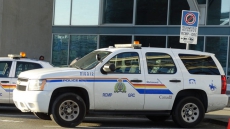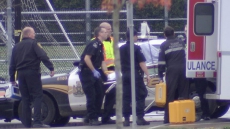TORONTO - Canadians struggling to make ends meet amid the COVID-19 pandemic were anxiously awaiting promised federal help on Wednesday as the countrywide toll climbed to the 3,000 mark and authorities began going after people violating public health orders.
Provinces reported hundreds of new cases on Wednesday, with 30 dead nationally. Quebec alone had 326 new cases and two more deaths, while Ontario reported 100 more cases — its largest single day jump.
To combat the spread, all people arriving in Canada will have to be quarantined for 14 days or face arrest and fines, Deputy Prime Minister Chrystia Freeland said. Other jurisdictions have also started clamping down.
"This is about taking very practical steps to protect the health and safety of Canadians," Freeland said.
In Newfoundland, a 53-year-old woman was arrested this week in Corner Brook for allegedly violating provincial public health orders to self-isolate for 14 days, Const. James Cadigan with the Royal Newfoundland Constabulary said from St. John's. She faces a fine of up to $2,500 or jail sentence of up to six months.
With governments implementing stiff restrictions aimed at slowing the epidemic and avoiding crushing an already stressed health-care system, an unprecedented number of people have seen layoffs and job losses over the past week. Close to one million new applications for employment insurance have been reported, much higher than average.
The brutal jobs reality was apparent in a new poll: Close to half of those asked reported they or someone in their house had lost work because of the outbreak. More than half who said they had lost work said their employers were not compensating them and trying to get employment insurance had proven difficult.
To that end, a $107-billion bill, including $52 billion in cash support, passed in the early hours and won Senate approval Wednesday. One measure will provide $2,000 per month for four months to workers whose income drops to zero because of the pandemic. The benefit should start getting to workers on April 6, Finance Minister Bill Morneau said.
The government also said it would spend $50 million as part of a United Nations initiative to help the world's most desperate people fight the pandemic.
"The world is connected," International Development Minister Karina Gould told The Canadian Press. "Whatever happens over there, far away, is something that can very easily come to our doorstep."
Almost 140,000 Canadians have now been tested for COVID-19, said Dr. Howard Njoo, deputy chief public health officer.
Some labs have reported a testing backlog due to diminishing supplies of essential chemicals. The World Health Organization says widespread testing is needed to curb the pandemic, but global demand has outpaced the supply of the specific chemicals needed.
Growing demand on health services prompted Ontario's nurses to call for more medical equipment to deal with COVID-19.
"Health organizations, across all sectors, are reporting shortages of personal protective equipment — a situation governments must urgently address," the Registered Nurses Association of Ontario said in a statement.
"The available ventilators, required to save lives during the pandemic — including the 300 additional ones Ontario has ordered — vastly underestimate the real need under a worst-case scenario," it said.
Experts say the virus causes mild flu-like symptoms in most people but can lead to life-threatening pneumonia in others: particularly the elderly and those with less optimal health. Besides frequent hand-washing, the best defence is "social distancing" — avoiding contact with others.
To ensure as little inter-personal contact as possible, provincial and local governments have taken increasingly urgent steps to force people to stay home. Many non-essential businesses have shut down. Across the country, much of normal daily life has ground to a halt with gathering places closed and people told to stay home.
Residential tenants and landlords have called on governments to offer relief before rent is due April 1. Some provinces have suspended rent hikes and halted evictions due to non-payment of rent.

